SAN MARCOS—Every week, students at six San Marcos elementary schools look forward to Friday—and not just because it signals the start of the weekend. That’s the day the children receive a paper sack filled with food, made possible by an organization First Baptist Church birthed.
Each Thursday, volunteers with School Fuel San Marcos fill 671 sacks with enough food for two full meals a day for the weekend, plus snacks. Every Friday morning, parent liaisons at the elementary schools place those sacks in the backpacks of children who rely on the free breakfast and lunch programs at school on weekdays.
‘Important for these kids to know someone cares’
“We serve 115 children every Friday at our school, and they are usually all there that day,” said Connie Perez, parent liaison at Travis Elementary School in San Marcos. “They have figured out they have to be there to receive the food.”
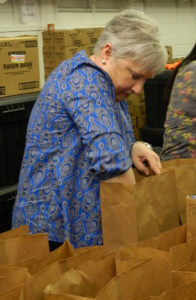
Kathy Hansen, a member of the San Marcos school board, was among the volunteers who helped pack the paper sacks for School Fuel recently.
“It’s unbelievable how important it is for these kids to know somebody cares,” she said.
From her 30 years experience as a classroom teacher, she knows what happens when students lack access to healthy food.
“They have headaches. They are angry and irritable. They want to sleep,” she said. “Food is a basic need. If we can help meet that need, we are equipping them to excel.”
A church with a strong missional mindset
School Fuel already was a thriving program when Chad Chaddick arrived at First Baptist Church as pastor three years ago.
“I inherited a church with a strong missional mindset,” Chaddick said. “Our folks see this as a natural extension of the church loving its neighbors. It’s a way to fulfill our call to feed the hungry. It’s an opportunity to give hope in a paper bag.”
Sign up for our weekly edition and get all our headlines in your inbox on Thursdays
Six years ago, Chaddick’s predecessor—Pastor Mark Newton—led a Wednesday evening missions class in which he challenged members to consider ways they could make a positive impact on lives in their community.
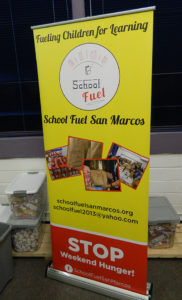
As the participants began to research community needs and potential ministries, they discovered more than seven out of 10 students in the San Marcos school district qualified for free or reduced lunches due to family income. They also learned many of those students lacked access to food most weekends.
Proven success
In spring 2013, First Baptist Church launched a three-month pilot ministry with a select group at Mendez Elementary School, where 86 percent of students participate in the free or reduced school lunch program.
The church provided food-filled sacks to 31 students each Friday, and then they evaluated the results. Among 30 of the 31 students, teachers reported improvement in their attitude, grades and attendance, and Monday visits to the school nurse became virtually nonexistent.
Encouraged by the results, representatives from the church met with community and school leaders during the summer break, raising money and enlisting volunteers to launch School Fuel at the beginning of the next school year.
During its first year as a ministry of First Baptist Church, School Fuel served 260 students at two schools—Mendez Elementary and De Zavala Elementary.
Open doors
School Fuel’s leaders soon realized the program could be more effective as a nonprofit organization distinct from First Baptist Church. As an independent nonprofit, School Fuel could apply for grants and receive donations from businesses that would not contribute to the ministry of a single church.
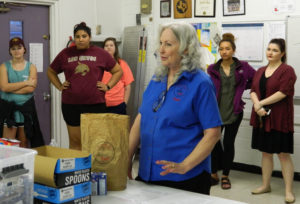
“That opened a lot of doors for us,” said Jenny Mangrum, a member of First Baptist Church and director of School Fuel.
Even so, everyone involved remains aware of the motivation behind the program.
“We pray before we pack every week, and the volunteers know that,” Mangrum said. “God has blessed, and we have grown every single year since we started.”
Still, Mangrum sees the need for expansion. She cannot bear the idea that some of this year’s students will lack food next year when they leave elementary school.
“We’ve got to get into the middle schools,” she said.
Broad base of community support
From September to December last year, School Fuel attracted 647 volunteers and support from 47 groups, including businesses, a local hospital, university fraternities and sororities, at least a half-dozen churches, service organizations, Boy Scouts and Girls Scouts.

It costs $215 to feed one child every weekend for one school year, said Nancy Smith, a member of First Baptist Church and treasurer for School Fuel.
Smith, who retired after more than three decades in public education, understands the importance of providing students with the food they need to grow and remain alert and attentive.
“The teachers are excited,” she said. “They say, ‘I don’t have to keep protein bars and peanut butter crackers in my desk any more for students who come to school hungry on Monday morning.’”
Likewise, School Fuel receives positive reports from parent liaisons who interact with students at each of the schools they serve.
“The children think it’s Christmas every Friday,” Smith said.
‘God always provides’
Smith’s husband, Larkin, handles logistics for School Fuel and continues to look for ways to improve efficiency. Originally, the group had to enlist drivers with trucks, vans and sports utility vehicles to deliver the food-filled sacks to schools each Friday morning. Now a moving company—Ace Relocation—pays its drivers to transport the food every week.

Smith helps his wife receive many of the in-kind donations local residents bring to School Fuel. Because items distributed to the schoolchildren must be uniform size, not every family-sized jar or can finds its way into a student’s sack. But nothing goes to waste.
“We all know where it’s coming from,” he said, pointing heavenward. “Those unusual donations go to meet unexpected needs that arise. We don’t know what the needs are yet, but God does. God always provides.”
School Fuel has received financial support from the Texas Baptist Hunger Offering, and an annual fund-raising banquet and silent auction for the program is held at First Baptist Church.
‘Seek the common good’
The fund-raiser originally filled the church’s atrium. When it outgrew that space two years ago, it moved into the sanctuary—and it may have to find a larger venue next year.
“It has grown exponentially in the last couple of years,” Chaddick said.
Recently, children at First Baptist Church in San Marcos participated in their own fund-raiser for the program. The children painted soup bowls that were auctioned, and all proceeds went to School Fuel. The activity not only raised $1,039, but also raised awareness.
“Most of our kids are not the ones in the school lunch programs—but there probably are a few that are,” said Melinda Hall, minister to preschool and children at First Baptist Church in San Marcos.
Members of First Baptist Church—those who volunteer with School Fuel and those who support it financially—recognize the importance of helping schools and the children they serve, Chaddick noted.
“It’s a practical expression of what God would have us do—to seek the common good,” he said. “It’s clearly an advantage to have an educated population that feeds into the community. That serves the good of the community. It seems obvious to us. …
“It’s just a natural fit for our church. I don’t think there was ever any theological angst about whether it was something we ought to be doing. It’s an obvious need, and it’s a way to show love for our neighbors.”
To view a video about School Fuel and the support the Texas Baptist Hunger Offering provides, click here.
This is part of an ongoing series about how Christians respond to hunger and poverty. Substantive coverage of significant issues facing Texas Baptists is made possible in part by a grant from the Prichard Family Foundation.
Read more articles like this in CommonCall magazine. CommonCall explores issues important to Christians and features inspiring stories about disciples of Jesus living out their faith. An annual subscription is only $24 and comes with two free subscriptions to the Baptist Standard. To subscribe to CommonCall, click here.





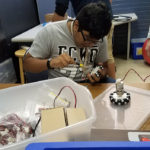
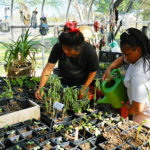








We seek to connect God’s story and God’s people around the world. To learn more about God’s story, click here.
Send comments and feedback to Eric Black, our editor. For comments to be published, please specify “letter to the editor.” Maximum length for publication is 300 words.